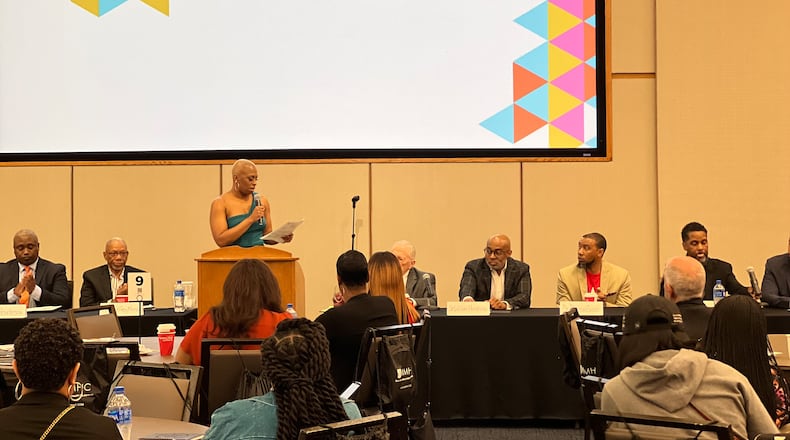Black men in particular often carry an undue burden when it comes to mental health due to a variety of factors, most of which are steeped in societal expectations of masculinity that when paired with race — and racism — can leave Black men feeling undervalued and unsupported.
The Black Men’s Mental Health Conference held at Sinclair Community College on Saturday is a new annual event with the goal to provide a safe space for Black men to learn about mental health issues and how they can address them, with the message that there is no shame in prioritizing your own wellbeing for the betterment of yourself, your family, and your community.
Former NFL player turned mental health expert Jay Barnett was the keynote speaker during Saturday’s event. Barnett said his personal struggles with mental health inspired him to change careers.
“I’m a two-time suicide survivor,” he said Saturday. “Most athletes, we put on a helmet, pick up the ball or the bat, and those sports become how we cope ... it was important for me to redirect my life and to really deal with things that I didn’t deal with when I was playing football.”
Barnett said suicide is the third leading cause of death among Black men in the United States, as reported by the U.S. Department of Health and Human Services Office of Minority Health, adding that societal and social factors come into play differently for Black men than for non-minority populations.
“The plight is different and we feel we have to show up knowing what we don’t know,” he said. “We’re providing space here for brothers to hear ... how they can begin to show up authentically for themselves because many of us are just performing, and I’m an advocate for living rather than performance.”
Saturday’s event was organized by Dayton residents Camillia Harris and Diona Clark.
“A lot of times, Black men don’t have a safe space to be able to let their mask down or just talk about some of the issues they’re experiencing within their homes, within society, or work,” Clark said.
Harris and Clark said this bottled-up emotion can have severe — even violent — consequences.
“We want to create that safe space so we can prevent some of these pain-based behaviors that we see,” Clark said.
This is something that hits close to home for Harris, who said her father carried out a murder-suicide in 2019 during a time of mental distress.
“I wish my father was here today to see this,” she said, adding that the event could have allowed her father to realize he needed help and given him the tools to receive it. “It could have sparked something ... to say, ‘You know what, I’m not okay.’”
About the Author

